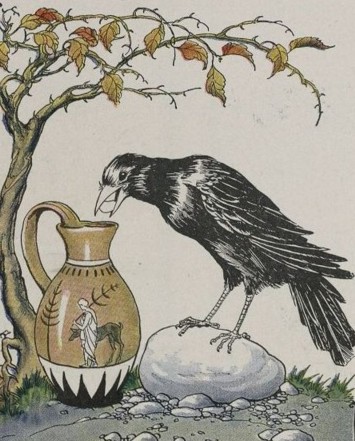PART A_1
Let’s learn vocabulary. Listen and repeat the words and the sentences with your tutor.
PART A_2
| 1. spell | /spel/ |
| -a short period of a particular type of weather | |
| The spell of dry weather worsened his skin condition. | |
| 2. thirst | /thurst/ |
| -a sensation of dryness in the mouth and throat caused by need of liquid | |
| They quenched their thirst with iced cold cola. | |
| 3. idea | /ahy-DEE-uh/ |
| -a thought, conception, or notion | |
| The team needs fresh ideas to promote the brand. | |
| 4. rise | /rahyz/ |
| -to move from a lower to a higher position or place; ascend | |
| The crime rate in the city rose by 10 percent this month. | |
| 5. wit | /wit/ |
| -the keen perception and cleverly apt expression of those connections between ideas that awaken amusement and pleasure | |
| His wit makes him unforgettable. |
PART B_1
Let’s read the story. Please read them aloud, and I will check your pronunciation and intonation.
PART B_2
THE CROW AND THE PITCHER

In a spell of dry weather, when the Birds could find very little to drink, a thirsty Crow found a pitcher with a little water in it. But the pitcher was high and had a narrow neck, and no matter how he tried, the Crow could not reach the water. The poor thing felt as if he must die of thirst.
Then an idea came to him. Picking up some small pebbles, he dropped them into the pitcher one by one. With each pebble the water rose a little higher until at last it was near enough so he could drink.
In a pinch a good use of our wits may help us out.
PART C_1
Let’s answer comprehension questions. Please answer them based on the story.
PART C_2
| 1. | What did the Crow find? |
| 2. | What was the body of the Crow like? |
| 3. | How did the Crow manage to drink the small amount of water in the pitcher? |
PART D_1
Let’s discuss the story. Please answer the questions below and express your opinions.
PART D_2
| 1. | How would you describe the Crow in the story? |
| 2. | If you were the Crow, how would you solve the problem? |
| 3. | If the Crow was not so thirsty, do you still think it would have succeeded in finding a solution to the problem? Why or why not? |
| 4. | The fable’s lesson is “In a pinch a good use of our wits may help us out.” Do you agree with this? Please explain. |
| 5. | How do you enhance your problem-solving skills? |
REVIEW AND FEEDBACK
Now, let us review the things that you learned in this lesson.
ではこのレッスンで学んだことを振り返りましょう。
(Please give a short feedback on how your student did on your class.)
| Grammar 文法 |
Pronunciation 発音 | Vocabulary 単語 |
Comprehension 理解 |
|
|---|---|---|---|---|
 GOOD GOOD |
文法の誤りはほとんどなく、完全な文章で話すことができる | ほとんどの単語をはっきりと正しく発音することができる | 習った表現を適切に使うことができる | 文章を理解し、質問に正しく答えることができる |
 FAIR |
文法の誤りはあるが、完全な文章で話すことができる | 発音の練習が必要な言葉がいくつかある | たまにミスはあるが、習った表現を適切に使うことができる | 文章を完全に理解するのは難しく、質問に正しく答えられないときもある |
 POOR |
文章で話すのは難しく、単語だけで話すことができる | 発音の練習が必要である | 習った単語と表現を少しだけ使うことができる | 文章を理解するのは難しく、質問に答えるのは難しい |
Parts of this lesson material are based on:
An eBook from The Project Gutenberg.
This eBook is for the use of anyone anywhere at no cost and with almost no restrictions whatsoever. You may copy it, give it away or re-use it under the terms of the Project Gutenberg License included with this eBook or online at www.gutenberg.org
An eBook from The Project Gutenberg.
This eBook is for the use of anyone anywhere at no cost and with almost no restrictions whatsoever. You may copy it, give it away or re-use it under the terms of the Project Gutenberg License included with this eBook or online at www.gutenberg.org